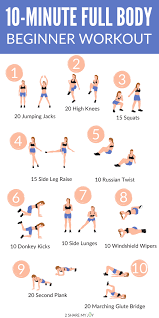The Benefits of Good Workouts for Your Health
Regular exercise is essential for maintaining good health and overall well-being. Engaging in effective workouts not only helps you stay in shape but also provides numerous benefits for your physical and mental health.
Physical Benefits
Good workouts help improve cardiovascular health by strengthening the heart and improving circulation. They also aid in weight management by burning calories and increasing metabolism. Additionally, regular exercise can enhance muscle strength, flexibility, and endurance, leading to better overall physical performance.
Mental Benefits
Exercise is known to have positive effects on mental health as well. It can help reduce stress, anxiety, and depression by releasing endorphins, which are natural mood elevators. Regular physical activity has also been linked to improved cognitive function and a reduced risk of cognitive decline as we age.
Long-Term Health Benefits
Consistent participation in good workouts can lower the risk of chronic diseases such as heart disease, diabetes, and certain types of cancer. It can also strengthen the immune system, making you more resistant to illnesses and infections. Furthermore, regular exercise promotes better sleep quality, which is crucial for overall health and well-being.
Tips for Effective Workouts
To get the most out of your workouts, consider the following tips:
- Choose activities that you enjoy to make exercise more sustainable in the long run.
- Vary your routine to target different muscle groups and prevent boredom.
- Set specific goals to track your progress and stay motivated.
- Stay hydrated before, during, and after your workouts to maintain optimal performance.
- Listen to your body and rest when needed to prevent overtraining and injuries.
In conclusion, incorporating good workouts into your lifestyle is a valuable investment in your health. Whether you prefer cardio exercises, strength training, yoga, or a combination of different activities, finding what works best for you is key to reaping the many benefits that regular exercise has to offer.
7 Essential Tips for an Effective and Safe Workout Routine
- Warm up before starting your workout to prevent injuries.
- Stay hydrated by drinking water before, during, and after your workout.
- Incorporate a mix of cardiovascular exercises and strength training for overall fitness.
- Listen to your body and rest when needed to avoid overtraining.
- Focus on proper form and technique to maximize effectiveness and prevent injuries.
- Set realistic goals and track your progress to stay motivated.
- Don’t forget to cool down after your workout to help with recovery.
Warm up before starting your workout to prevent injuries.
It is crucial to warm up before starting your workout to prevent injuries. A proper warm-up prepares your body for the physical activity ahead by increasing blood flow to the muscles, raising your core body temperature, and loosening up your joints. This helps reduce the risk of strains, sprains, and other exercise-related injuries. By incorporating a dynamic warm-up routine into your workout regimen, you can enhance your performance, flexibility, and overall safety during exercise sessions. Remember, taking a few extra minutes to warm up can make a significant difference in maintaining a healthy and injury-free fitness routine.
Stay hydrated by drinking water before, during, and after your workout.
Staying hydrated is a crucial aspect of effective workouts. It is recommended to drink water before, during, and after your exercise session to maintain optimal performance and prevent dehydration. Hydration plays a key role in regulating body temperature, lubricating joints, and transporting nutrients to cells. By ensuring that you are well-hydrated throughout your workout, you can improve your endurance, focus, and overall workout experience. Remember to listen to your body’s signals and drink water regularly to support your fitness goals and well-being.
Incorporate a mix of cardiovascular exercises and strength training for overall fitness.
Incorporating a mix of cardiovascular exercises and strength training into your workout routine is essential for achieving overall fitness. Cardiovascular exercises, such as running, cycling, or swimming, help improve heart health, endurance, and burn calories effectively. On the other hand, strength training, like weightlifting or bodyweight exercises, builds muscle strength and enhances metabolism. By combining both types of workouts, you can experience a well-rounded fitness regimen that not only boosts your cardiovascular health but also increases muscle tone and overall strength. This balanced approach to exercise contributes to better physical performance and overall well-being.
Listen to your body and rest when needed to avoid overtraining.
Listening to your body and recognizing when it needs rest is crucial in maintaining a healthy workout routine. Overtraining can lead to fatigue, decreased performance, and an increased risk of injury. By paying attention to signs of exhaustion or muscle soreness and allowing adequate time for recovery, you not only prevent burnout but also promote better overall progress and long-term fitness success. Remember, rest is just as important as the workout itself in achieving optimal results and ensuring your body stays strong and resilient.
Focus on proper form and technique to maximize effectiveness and prevent injuries.
Focusing on proper form and technique during workouts is crucial for maximizing effectiveness and reducing the risk of injuries. By ensuring that you are performing exercises correctly, you target the intended muscle groups more efficiently, leading to better results. Additionally, maintaining proper form helps prevent strain on joints and muscles, minimizing the likelihood of overuse injuries. Paying attention to your body alignment and movement patterns not only enhances the benefits of your workout but also promotes long-term physical health and well-being.
Set realistic goals and track your progress to stay motivated.
Setting realistic goals and tracking your progress is a crucial tip for maintaining motivation and seeing results in your fitness journey. By establishing achievable milestones, you can stay focused and measure your advancements over time. Whether it’s aiming to increase the number of push-ups you can do or improving your running pace, having tangible goals keeps you accountable and provides a sense of accomplishment as you reach each target. Tracking your progress not only helps you stay motivated but also allows you to adjust your workouts accordingly to continue challenging yourself and making steady improvements.
Don’t forget to cool down after your workout to help with recovery.
After completing your workout, it’s crucial not to overlook the importance of a proper cool-down session. Cooling down after exercise plays a significant role in aiding recovery by gradually lowering your heart rate and easing your muscles back to their resting state. This post-workout phase helps prevent muscle soreness, reduces the risk of injury, and promotes flexibility. By incorporating a cool-down routine into your workout regimen, you can enhance your overall recovery process and set the stage for future successful workouts.





Hi, i think that i saw youu visited my blog thu
i came to “return thhe favor”.I’m attempting tto find things too enhance myy site!I suppose its ook too use a few of your ideas!!
Thank you for visiting our blog and for your interest in enhancing your own site. We’re glad you found the information helpful! Feel free to incorporate some of the workout ideas and tips shared in our article to improve your content. Remember, regular exercise not only benefits physical health but also contributes to overall well-being. Best of luck with your site improvements!